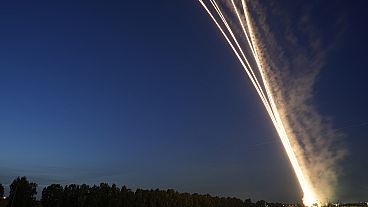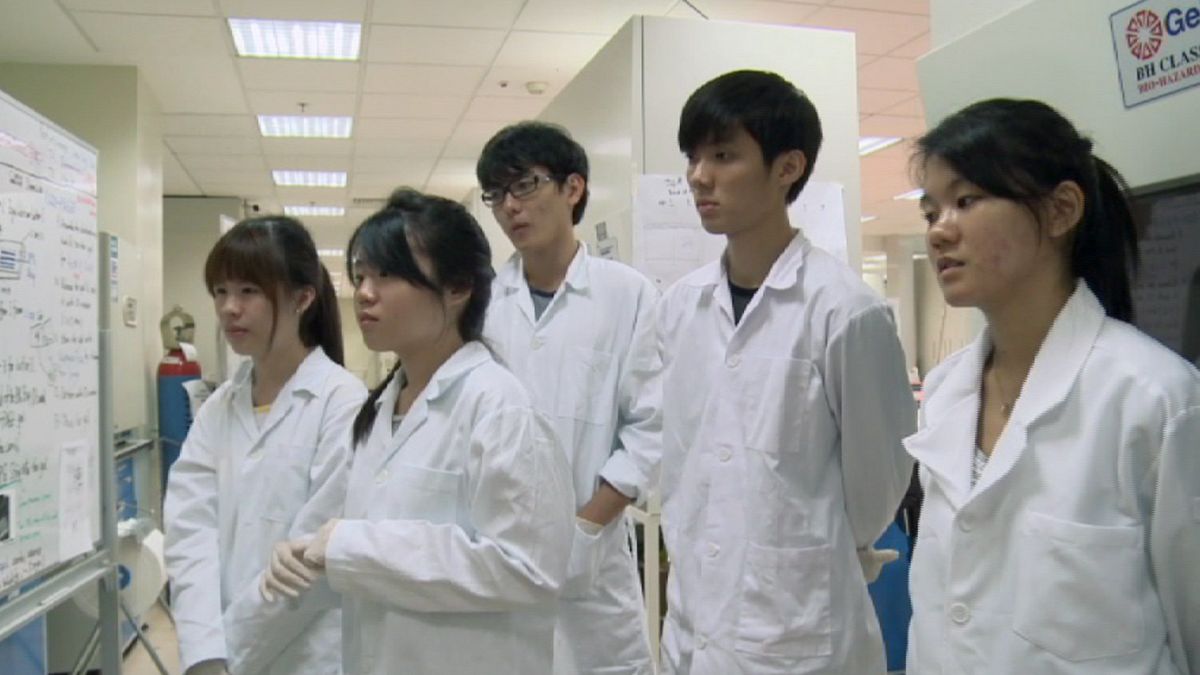In many countries, there is a strong demand for staff with strong qualifications in so-called STEM subjects ie Science, Technology, Engineering and Maths. According one report there is a demand for up to 100,000 new STEM graduates a year in the UK alone. Yet many students drop these subjects.
Singapore Sci-tech
Nanyang Technological University boasts cutting-edge research and development facilities, as well as arts and media schools. In many ways it represents what Singapore is aiming for – solid science and technology departments plus creative ways of thinking and teaching.
Prof Bertil Anderssson, president of NTU explained: “It’s actually more important to learn how to learn; how to use the information available. And also to be a little bit entrepreneurial, and understanding group leadership, social skills. So this is what we have been doing at NTU, to make education even in engineering a little bit softer, a little bit broader.”
Students studying STEM subjects on the Renaissance Engineering programme also do business studies and social sciences. One student explained: “An engineer cannot only know how to create a product, they have to know if this product has a selling point, if it can appeal to the public. This is when you need to know how the society works, using social science.”
The Singapore government is funding research at this university in fields such as clean energy, nano-technology and biomedical engineering. The hope is that these students will not just be qualified engineers but leaders in their fields.
This investment in education means Singapore is moving steadily towards its goal of becoming a global hub of science, technology and innovation.
Cyprus: Nothing Boring
In Nicosia in Cyprus, sandwiched between the UN buffer zone and the areas controlled by the Republic of Cyprus – Science has just got a lot more interesting. The local Community Media Centre is hosting an educational science show called Vikexploratorium and it’s so amusing that all sorts of people have come along to watch, not just students.
The idea behind the show is to demonstrate complicated scientific phenomena from everyday life in a way which is both fun and educational – showing that everyone can grasp scientific concepts.
The creator of Vikexploratorium, Viken Tavitian, said: “The idea of the experiments is to have a hands-on approach to education. Lot of people may hear the theories but they have no idea what is in real life, but I show the opposite sequence of events. I do the experiments to show what is the actual theory behind it. It’s like I come from the practical aspect of the science, rather than starting from the theory and going to the practice.”
“When Viken, who used to be a physics researcher at the University of Illinois, moved to Cyprus, he found it impossible to get a job as a researcher. But now he’s opening an Armenian bakery – but with a science twist. He said, “We would do my science shows here to attract the kids and also we would like to teach them the science of food as well, because baking has a lot to do with science, thermodynamics, physics and the bio-chemichal effects of baking with heat.”
Viken believes that science education is too important to be given up: “I want to raise my children in an environment where science is like fun; they relate science and technologies to what is around them; they are not just simple users, they really understand the technologies, how they have been developed, so they, themselves, can capture the essence of it and be educated in the spirit of it. The spirit of science is the most important thing.”
For more information see
http://www.youtube.com/watch?v=XAPAPuG3v8812
http://vikexploratorium.blogspot.fr
Russia: Innovation city
Skolkovo is said to be the innovation city of Russia. Four years ago, the government allocated over 2 billion euros to the development of the city, which will include various clusters – IT, Space and Nuclear technology among them.
The concept is really building today in order to educate for tomorrow. The core of the project is education in STEM subjects (Science, Technology, Engineering and Maths) and the Skolkovo Institute of Science and Technology (Skoltech) is due to be officially opened this September.
But the first students are already enrolled in the pilot programme and the vice-president, Oleg Alekseev, is optimistic about the future: “I don’t think its obvious today for most people. But If you want to control markets and have a good quality economy, you have to control technologies. In order to have a successful innovation centre you need a technology university at its core.”
When the Skoltech campus is finished, it will host 1,200 post-graduate students. The concept is based on the experiences of the Massachusetts Institute of Technology, among others. One of the goals is to connect science and business, so that STEM subjects become more relevant to real life and more helpful to the economy.
Ilya Dubinsky, the director at the Skoltech Centre for Entrepreneurship & Innovation said: “It is almost impossible to develop the idea right through to its social impact if you are working alone. You need to work with other people who can deal with aspects you cannot. You need to find investors and talk to them in their own languages. You need to find engineers from other spheres. You need to find sales managers. Other countries are in a better position compared to us. They already have this ecosystem. We have to create this business environment from scratch.”
The Skolkovo Foundation has already launched Open University, a project to bring science and business together. And it seems to be working. Private investors and partners are very interested in the ideas pipeline that is being created here and as of today, the Skolkovo Innovation Centre has 710 participating companies.
For more information see: http://www.skoltech.ru


